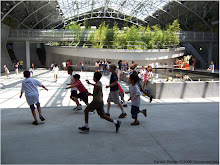Museum
Director, Renton History Museum
Renton, WA
estewart (at)
rentonwa.gov
When the
Renton History Museum launched our master plan process, we knew we had an
intimidating set of challenges to address. Some were specific to our city and organization, and others
were the same 21st-century challenges that museums across the
country (around the world!) are tackling. We
had some great assets as well: a fully engaged board and staff, operational
support from our city, and creative consultants used to thinking outside the
box. And “outside-the-box”
definitely describes the strategic approach that we developed together!
At
the end of our six-month master planning process, the new strategic approach we
settled on is one we’re calling the Experimental History Project. The approach calls for the Renton
History Museum to break down barriers between “doing history”—traditionally the
job of staff—and “viewing history”—formerly the role of museum visitors. The plan calls upon the museum to work directly
with our community to link the past to the present and the future in ways that
are relevant to those we’re working with, whomever they may be: students,
ethnic communities, artists, scientists, engineers, the list goes on. Exhibits
and projects will be designed to attract project-specific resources, whether
ideas, funding, or humanpower.
The
new program is designed to allow staff to take calculated risks and learn from
them to improve how we fulfill our mission. To some extent it incorporates the learning process into
actual museum operations: we explore a new idea, measure it against a matrix of
our strategic goals, enlist partners, try the idea together, and then
incorporate the lessons learned and partnerships established into the next
project. The Experimental History Project recreates the museum as a Big Tent;
staff trade control for greater involvement and engagement by the historically
minded.
 How
does the new strategic approach address our challenges? Start with the need to grow a new
generation of supporters—whether volunteers, members, or donors. The Experimental History Project
assumes that every project we undertake will involve partners. Whether they are helping us develop a
new exhibit or lending us objects or photographs or offering programs, these
partners will continually renew our connection to the community, and keep their
concerns at the core of our operations. Because our projects will be interdisciplinary—history and
art, for example, or history and science—we will speak to stakeholders who are
not necessarily already narrowly interested in history. And because of our willingness to take
risks together with our community, we all become joint stakeholders in the
success of the museum.
How
does the new strategic approach address our challenges? Start with the need to grow a new
generation of supporters—whether volunteers, members, or donors. The Experimental History Project
assumes that every project we undertake will involve partners. Whether they are helping us develop a
new exhibit or lending us objects or photographs or offering programs, these
partners will continually renew our connection to the community, and keep their
concerns at the core of our operations. Because our projects will be interdisciplinary—history and
art, for example, or history and science—we will speak to stakeholders who are
not necessarily already narrowly interested in history. And because of our willingness to take
risks together with our community, we all become joint stakeholders in the
success of the museum.
If
this all seems a little theoretical, that’s because it is a plan, the details
of which have not yet been worked out.
Some unknowns are already emerging. We’re finding some funders squeamish about the notion of
supporting an “experiment” in a tough funding climate and in a
discipline—history—that’s notoriously slow to embrace innovation. Potential partners are clamoring to be
involved; we are figuring out how to be strategic about how many projects we
can work on simultaneously. Finally, we are experiencing the inevitable resource lag,
particularly in a flat economy, in which the museum has a surplus of excitement
and ideas, without a comparable surplus of funding (yet).
We
believe these are challenges that we will work through in the implementation of
the Experimental History Project. We’re excited to embark on a new vision that,
if successful, could be a model for other museums.








No comments:
Post a Comment